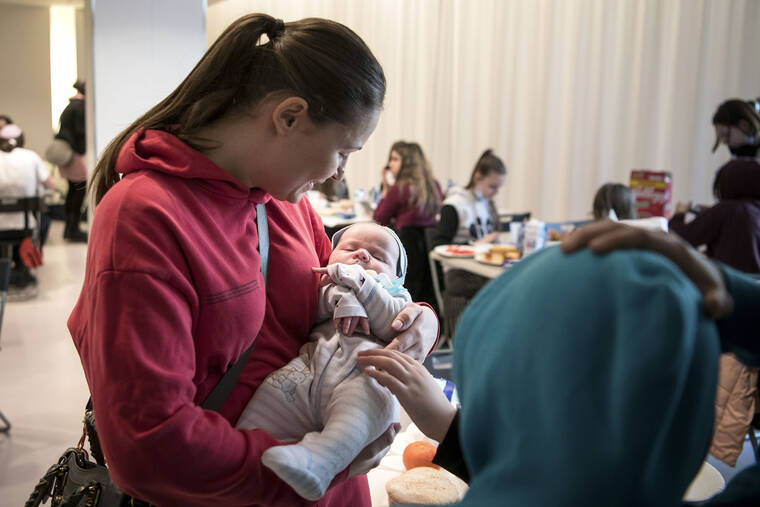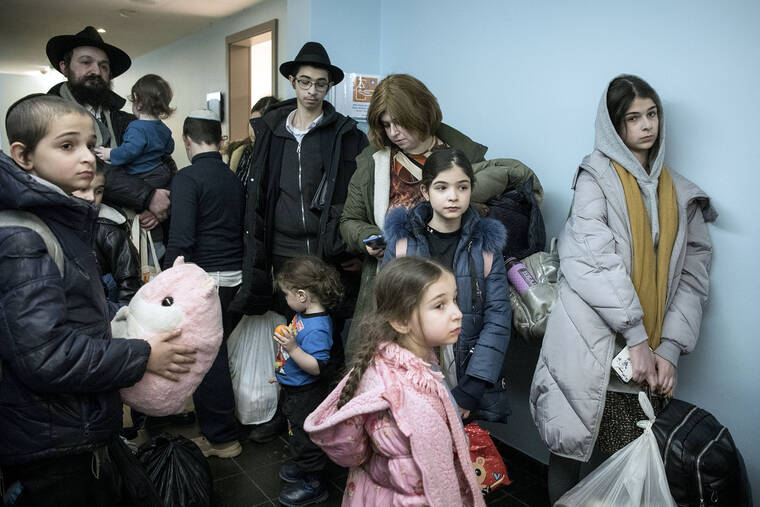‘I love Berlin’: Jewish refugee kids reach safety in Germany
BERLIN — Maxim and Shaul had spent the last 52 hours on a bus full of dozens of Jewish refugee children that took them from war-torn Ukraine in the dark of night and across six European borders to safety in Berlin.
Pale, tired and overwhelmed, the two teenagers looked around when they finally arrived in the German capital Friday morning. There were lots of police officers in front of their hotel who had cordoned off the street so the 105 children could exit their buses as Jewish women from Berlin’s Chabad community spontaneously started singing at the top of their voices to give them a joyous and relieved welcome.
ADVERTISING
“I love Berlin, it’s beautiful,” 14-year-old Maxim said a little while later as he sat down to a kosher breakfast of tuna salad, cucumbers, cereal, eggs and pita bread. “Last week we were still sitting in the bunker and the sirens were wailing nonstop.”
His friend Shaul, 13, nodded, too tired to say much, straightened his red-checkered kippa and went over to one of the 15 foster home staffers to make sure he and Maxim would be sharing a room in Berlin. The children’s last names were withheld because they are minors.
Only three days earlier, Rabbi Yehuda Teichtal, a Berlin rabbi and the head of the local Chabad community, had received a phone call from a rabbi in the Ukrainian port city of Odesa begging him to help get the children and teens from the foster care home Mishpacha — Hebrew for family — to a peaceful and secure place.
“It’s been a huge challenge but with the grace of God we worked it out together to bring these precious souls into safety,” Teichtal, 49, told The Associated Press. The rabbi and a team of around 100 volunteers from the Chabad community had barely slept since they got the call for help from Odesa.
They soon figured out that traveling by plane would not be an option since about 40 of the children had no passports, only birth certificates. So they talked to diplomats and security officials from Israel, Germany and other European countries the children would have to travel through for help making the 1,000-mile (1,700-kilometer) overland trek come true.
They raised money from Jewish aid groups and told the children to quickly pack warm winter clothes. The teenagers also took along their cell phones, while the little ones clutched their favorite stuffed animals tightly.
“When we got on the road, we told the children that we are going on a winter trip,” said Rabbi Mendy Wolff, 25, from Odesa, who accompanied the children on the journey. “They should not feel like refugees for a single moment.”
Thanks to the joint international diplomatic efforts the buses crossed the borders of Moldova, Romania, Hungary, Slovakia and the Czech Republic, before finally entering Germany without any problems.
“They made a ‘green corridor’ for us,” Wolff said. When they crossed from Moldova to Romania, the buses were even allowed to use the diplomatic lane, passing a long line of around 100 buses full of other Ukrainian refugees waiting to get into the European Union.
More than 1 million people have fled since Russia invaded Ukraine last week. Several thousand have reached Germany. Many are coming to Berlin, with hundreds arriving daily on trains via Poland. The Berlin mayor, Frankziska Giffey, said earlier this week that around 20,000 refugees from Ukraine are expected to reach the city in the near future.
Most of the children from the Odesa home are foster kids, some are orphans and a few are members of the city’s Chabad community who were sent out of the country by parents who couldn’t flee their homes. Not all teenagers from the foster care home could come along. Boys aged 18 and older had to stay behind as men of military age are not allowed to leave the country.
Baby Tuvia — only 5 weeks old — cried a little as the kids left the breakfast hall for their rooms. Sada, who had just turned 5, proudly held onto a big birthday balloon as she walked through the hallways with one of the caretakers, and Shoshana Khusid, 18, and one of the oldest, stared out of the window worrying about her parents back home.



